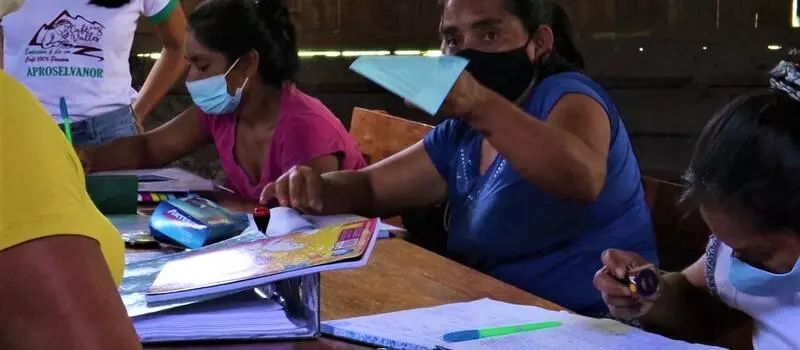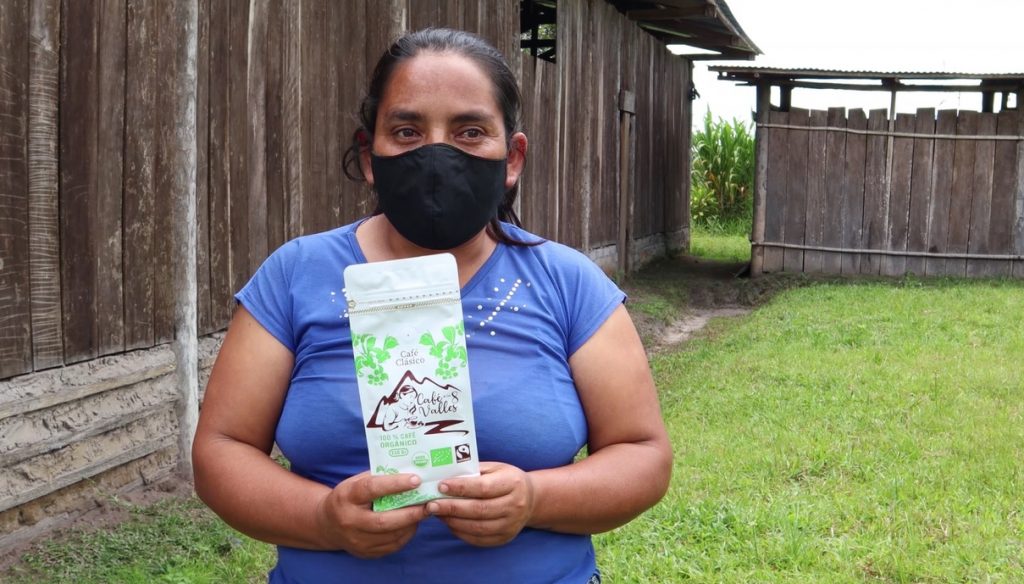
How Grassroots Savings-and-Credit Unions Can Improve Access to Finance for Rural Women
Editor’s note: This story originally appeared in Agrilinks on October 12, 2021.
The female members of the Asociación de Productores Selva Nororiental (APROSELVANOR) cooperative had many ingredients for success: a strong desire to make their farms productive and profitable, a cooperative organization that supported their efforts and even their own coffee brand: 8 Valles, named for the eight river valleys that surrounded their rural community in the province of Moyobamba, Peru. But they were missing an important ingredient: access to finance.

They’re hardly alone. Accessing savings and credit is difficult in rural communities, but it’s particularly hard for women who are less likely to legally hold assets, frequently have less power in household financial decision-making, and are less likely to receive training on financial management. In Peru, 12% of rural men save in the formal banking system while just 2% of rural women do the same. Meanwhile, just 4% of rural women in the country have access to credit. Without such access, farmers can struggle to make needed investments on their farms; manage disruptions like natural disasters, pandemics or health problems; or even cover basic family expenses like schooling, healthcare, and nutrition.
How can we help support women’s access to savings and credit in farming communities?
As we prepare to mark International Day of Rural Women on October 15th, the experience of the Coffee Alliance for Excellence (CAFE) — a USAID initiative implemented by TechnoServe, with support from Jacobs Douwe Egberts (JDE), that is designed to improve the livelihoods of coffee-farming families in Peru — demonstrates that helping to establish grassroots savings-and-credit unions is one promising pathway.
UNICAs: A Unique Approach to Access to Finance
Uniones de crédito y ahorro (UNICAs) are savings-and-credit unions formed by a few dozen families from a rural community. Members make regular deposits to the UNICA, which then uses the funds to provide small loans to members or finance other commercial activities. Members become shareholders in the UNICA and receive a portion of the profits from the loans and business ventures. These grassroots financial institutions developed in order to help rural Peruvian communities access financial services that would otherwise be unavailable.
CAFE, in conjunction with the Peruvian development bank COFIDE, helped community members to create and strengthen 39 UNICAs. Because UNICAs are administered by their members, it is vitally important that participating families and the elected leadership receive training on financial literacy, and CAFE has helped to build these skills. The UNICAs supported by CAFE have provided more than $400,000 in loans since 2019, and nine of the unions have established small businesses — micro retail shops, fertilizer distributors and coffee processors — to provide services to community members and income to shareholders.
Amid the COVID-19 pandemic, CAFE has also helped the UNICAs shift to the use of digital payments. Mobile wallets have allowed the UNICAs to collect payments, distribute loans, and disburse profits in a contact-free environment — and members are then able to perform a number of transactions with their mobile money accounts.
Supporting the Participation of Women in UNICAs
Because UNICAs do not have some of the access barriers — such as legal possession of assets — that traditional financial institutions do, they are particularly promising avenues for improving women’s access to financial services. CAFE has focused on ensuring that the recruitment and training for UNICA members supports the participation of women at all levels of the unions, building awareness of the importance of gender inclusion in the success of the UNICAs.
Among the 39 UNICAs participating in the project, 46% of the members are women, 45% of the leadership positions are held by women, and 47% of loans have been distributed to women.
At 8 Valles, where CAFE supported the formation of an UNICA in 2020, all of the members and leaders are women. “Alongside APROSELVANOR, we formed the UNICA, as women, to have our own savings and to succeed along with our families,” explained Lilibeth Llanos Fernández, president of the group.

“We’re very happy and very proud that this program is working even better than we had expected,” said Karen Guevara Sánchez, a manager at APROSELVANOR. “Our members are happy and are working together towards the shared goal of being able to save, invest, access low-interest loans, obtain capital and bring their earnings home to improve the quality of life of their families.”
The UNICA has helped the women of 8 Valles to improve and increase their production. They launched the brand in March 2020 and produced 146 bags of coffee the first month; they’ve since increased that to 300 per month. Even amid the pandemic, they’ve been able to sell their coffee through catalogue orders and a virtual store.
The experience of coffee growers in Peru highlights the opportunity presented by grassroots savings-and-credit organizations to improve the access of rural women to financial services. By supporting such organizations, and ensuring that women have equal opportunities to participate in them and benefit from them, we can ensure that female farmers have access to the savings and credit they need to build resilience, improve their livelihoods and enjoy a better quality of life.





